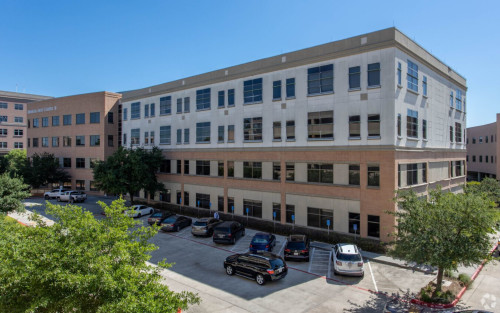



Eating Recovery Center The Woodlands
Treatment Focus
You can get treatment for eating disorders at this center, helping you navigate symptoms, build coping tools, and restore your physical health under expert care.
Primary Level of Care
Outpatient treatment offers flexible therapeutic and medical care without the need to stay overnight in a hospital or inpatient facility. Some centers off intensive outpatient program (IOP), which falls between inpatient care and traditional outpatient service.
Claimed
Recovery.com has connected directly with this treatment provider to validate the information in their profile.
Treatment Focus
You can get treatment for eating disorders at this center, helping you navigate symptoms, build coping tools, and restore your physical health under expert care.
Primary Level of Care
Outpatient treatment offers flexible therapeutic and medical care without the need to stay overnight in a hospital or inpatient facility. Some centers off intensive outpatient program (IOP), which falls between inpatient care and traditional outpatient service.
Provider's Policy
We are in-network with most insurances. We do not take Medicaid or Medicare. To ensure you can pursue recovery, our dedicated team will work on your behalf by acting as a liaison with your insurance provider, answering your questions, and providing guidance and support every step of the way.
Eating Recovery Center The Woodlands
Eating Recovery Center The Woodlands
About Eating Recovery Center The Woodlands
Located in The Woodlands, The Eating Recovery Center specializes in treatment for adults, adolescents (ages 13 to 17), and children (ages 8 to 12) with eating disorders and co-occurring mental health issues. Their services include inpatient and day treatment programs. The Eating Recovery Center uses an evidence-based approach to provide each patient with the necessary support to achieve long-term recovery. Their treatment team includes psychiatrists, registered dietitians, family clinicians, nursing support, and educational specialists who are dedicated to helping clients heal in a safe and supportive environment.
Comprehensive Care Plan
The Eating Recovery Center uses a holistic and personalized approach to treat eating disorders, combining medical, psychological, and nutritional support. The center provides treatment for adults, adolescents, and children struggling with anorexia, ARFID, bulimia, compulsive overeating, orthorexia, and other specified eating disorders. Their team is trained on evidence-based therapies, providing options for even the most complex cases.
Tailored Therapy Paths
At The Eating Recovery Center, the clinicians use body image therapy, exposure therapy, acceptance and commitment therapy (ACT), dialectical behavior therapy (DBT), and cognitive behavioral therapy (CBT) to help clients build resilience, navigate stress, and create lasting connections with others. Additionally, they offer group therapy, family therapy, and nutritional counseling to strengthen each client's recovery.
Continuum of Care in a Serene Setting
The Eating Recovery Center offers a modern, nurturing environment with a variety of amenities and services, including quiet therapy spaces, art groups, yoga therapy, and a demo kitchen where patients have hands-on experience with food preparation and exposure. Only 35 miles north of Houston, this location overlooks a lake, providing a serene location for healing. There is also accessibility to nearby apartments for those traveling from out of state and in need of accommodations. The aftercare program provides comprehensive care for sustained recovery, including support groups for alumni and family members, reunion events, and resources for further care.

Center Overview
Treatment Focus
You can get treatment for eating disorders at this center, helping you navigate symptoms, build coping tools, and restore your physical health under expert care.
Joint Commission Accredited
The Joint Commission accreditation is a voluntary, objective process that evaluates and accredits healthcare organizations (like treatment centers) based on performance standards designed to improve quality and safety for patients. To be accredited means the treatment center has been found to meet the Commission's standards for quality and safety in patient care.

Insurance Accepted
Pricing and Program Length
Estimated Center Costs
The cost listed here (Call for Rates), is an estimate of program cost. Center price can vary based on program and length of stay. Contact the center for more information. Recovery.com strives for price transparency so you can make an informed decision.
Levels of Care






Your Care Options
Specializations
Co-Occurring Disorders
A person with multiple mental health diagnoses, such as addiction and depression, has co-occurring disorders also called dual diagnosis.
Eating Disorders
An eating disorder is a long-term pattern of unhealthy behavior relating to food. Most people with eating disorders have a distorted self-image.
Who We Treat
Men and Women
Men and women attend treatment for addiction in a co-ed setting, going to therapy groups together to share experiences, struggles, and successes.
Adolescents
Teens receive the treatment they need for mental health disorders and addiction, with the added support of educational and vocational services.
Children
Treatment for children incorporates the psychiatric care they need and education, often led by on-site teachers to keep children on track with school.
Approaches
Personalized Treatment
The specific needs, histories, and conditions of individual patients receive personalized, highly relevant care throughout their recovery journey.
Evidence-Based
A combination of scientifically rooted therapies and treatments make up evidence-based care, defined by their measured and proven results.
Family Involvement
Providers involve family in the treatment of their loved one through family therapy, visits, or both–because addiction is a family disease.
Therapies
1-on-1 Counseling
Patient and therapist meet 1-on-1 to work through difficult emotions and behavioral challenges in a personal, private setting.
Acceptance and Commitment Therapy (ACT)
This cognitive behavioral therapy teaches patients to accept challenging feelings and make the appropriate changes to reach personal goals.
Art Therapy
Visual art invites patients to examine the emotions within their work, focusing on the process of creativity and its gentle therapeutic power.
Nutrition Counseling
Nutritious food helps patients heal from within, setting them up for mental and bodily wellness as they learn about healthy eating.
Body Image Therapy
Therapists use cognitive behavior techniques to challenge how patients perceive their body and their worth, rewriting negative thoughts and attitudes.
Experiential Therapy
With this approach, patients heal by doing. Therapists help patients process difficult emotions to speak, using guided activities like art or dance.
Conditions We Treat
Eating Disorders
An eating disorder is a long-term pattern of unhealthy behavior relating to food. Most people with eating disorders have a distorted self-image.
Substances We Treat
Co-Occurring Disorders
A person with multiple mental health diagnoses, such as addiction and depression, has co-occurring disorders also called dual diagnosis.
Languages
Aftercare
Care Designed for Your Needs
Personal Amenities
Amenities
Activities






